Kategorie: ‘Bilbao’
My Internship at the EHU Bilbao
- Biology M. Sc.
- Spain, Bilbao
- Universidad del País Vasco (UPV)/ Euskal Herriko Unibertsitatea (EHU)
- 07/2024 – 09/2024
When I reached out to the Cell Communication and Transcription Lab at EHU Bilbao for a placement, I was quickly connected with my future supervisor. We arranged an online Zoom meeting, and from the start, I felt genuinely welcomed. She was incredibly helpful in organizing my stay, handling all the necessary university paperwork, and went out of her way to ensure everything was in place. It was at that moment I knew I would be well-supervised, and that this internship would be a great success.

© Jule Wahl
Although the university is located far outside the city, I was advised to find accommodation in the city center for better social connections and public transportation. I found my room on Idealista, a popular platform for finding apartments in Spain. For me, finding a reasonably priced room in a shared apartment near the river was relatively easy, but knowing at least some Spanish greatly helps in communicating with landlords, who often speak only Spanish. I ended up living with a girl from Catalunya, a girl from Peru, and one from France. Two of them were students, and the other was working. We got along really well, and they made every effort to make me feel welcome and comfortable in the flat. While we didn’t spend much time together in the end, it was still nice getting to know them!
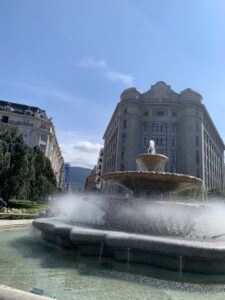
© Jule Wahl
My first impression of the city was different from what I expected of a typical Spanish city. This is because Bilbao is not quite Spain—it’s the Basque Country, something I later learned is very important to acknowledge. The architecture reminded me more of Central Europe, with modern and stylish buildings. The Nervión River flowing through the city provides a contrast to the otherwise dense urban landscape, creating a special atmosphere, especially at night when the lanterns reflect off the water. I really enjoyed taking walks by the river towards the old town, chatting with friends or responding to voice messages, as there are parks and green spaces along the way. The old town (Casco Viejo) is beautiful to explore and becomes even more vibrant at night. Every day of the week, you can find people enjoying drinks and Pintxos, the Basque version of tapas. My favorite Pintxos were the mini burgers and slices of baguette topped with various salads.
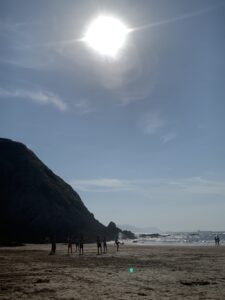
© Jule Wahl
Nature in Bilbao is lush and green, thanks to the high humidity and frequent rain. The surrounding hills and mountains offer excellent hiking routes with stunning scenery, such as the trails around Trapagaran. About 40 minutes from the city center by public transport, you’ll find large, beautiful beaches with breathtaking cliffs and sunsets. My favorite was Sopelana Beach, which I highly recommend for a spectacular sunset.
Because my stay coincided with exam season and the university’s semester break, there weren’t many students on campus, and the Erasmus students left a week after I arrived. However, I was part of the Happy Erasmus WhatsApp group for Bilbao, which allowed me to join their last gathering. Not knowing anyone in the city, I simply asked in the group chat if anyone was going out that night and if I could join them. A really nice Czech girl replied, and we met up with her group for a pre-party. We clicked instantly and had a fantastic night, which ended with a spontaneous swim in the sea. We went to a techno club called Sonora, which was a nice change from the usual bachata and salsa music. In general, Bilbao doesn’t have many clubs; it’s more common to go to small bars, particularly in Casco Viejo, where you can dance to loud music. If you’re looking for an experience full of partying and socializing with Erasmus students, I recommend coming during the semester when there are more activities and it’s easier to meet people. I also attended some language exchange meetings that I found on the Meetup app (which I highly recommend for meeting new people in a new city!) and created a Bumble BFF account specifically to find friends.
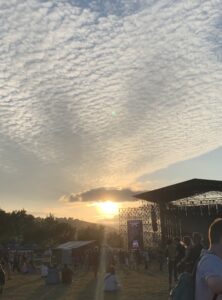
© Jule Wahl
During my stay in Bilbao, I was eager to follow the Euro 2024 football tournament in Germany, especially in the company of others. I heard about a German bar that always showed football matches, so I went there for the Germany games. I struck up a conversation with a group of young Germans, and we immediately hit it off. They were taking a language course in Bilbao, and from then on, we watched all the games together. The bar is also worth visiting—the owner is very friendly, and you can speak German with him! While I didn’t try the food, I heard great things about it. We watched the final at a public viewing event in Parque de Doña Casilda, which culminated in Spain’s victory. I also attended the popular BBK Bilbao festival, held on a hill just outside the city. It was easy to get there by bus, and we walked back afterward. I asked in the Erasmus WhatsApp chat who was going and if I could join, as I didn’t want to go alone. Fortunately, a German guy replied, inviting me to join him and his friends. We had an amazing evening, with the highlight being dancing to Jungle’s live performance. Bilbao and the surrounding towns have a lot to offer young music lovers, with numerous street fiestas and concerts during this time of year.
I highly recommend exploring the various towns around Bilbao, such as Portugalete, Santurtzi, Getxo, and Muskiz, which offer beautiful nature and charming towns. A day trip to the stunning city of San Sebastián is also well worth it, and the bus tickets are quite affordable! You can also easily travel to Madrid, Santander, Zaragoza, Vitoria-Gasteiz, Burgos, and other cities by bus or train, and if you prefer to fly, there are plenty of low-cost options to explore all of Spain.
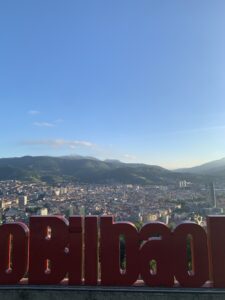
© Jule Wahl
My academic experience was also incredibly valuable. I learned a lot of methods and concepts related to working with mammalian cells and maintaining them in culture. The atmosphere in the lab was everything I could have hoped for, helping me realize what aspects are important to me in a working environment. I made many friends and colleagues who enriched my network, and I plan to stay in touch with them. This experience made me more open to meeting new people, finding ways to connect, and getting along with them right away. I’m certain it shaped my character in ways that only an experience abroad can.
Internship in Bilbao
- Business Administration and Engineering: Mechanical Engineering M.Sc.
- Spain, Bilbao
- FEV Consulting Iberia
- 10/23 – 02/24
Application/Finding an internship
I started the internship search for an internship in Spain very early (about 5 months before the start of the internship), as it is advisable to expect sufficient lead time for applications
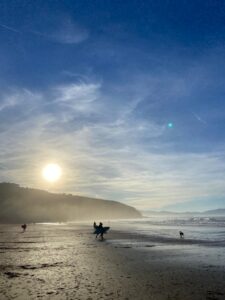
© Johann von Harling
Surfing beach in Sopelana
for internships abroad. I narrowed down the internship search to Spain because I am very interested in this country and also wanted to deepen my language skills. My approach to the application process involved systematically identifying companies in my area of specialization through internet research and searching for internship openings in the Career section of each website. Additionally, I also sent spontaneous applications to smaller companies. With larger companies, there is a greater likelihood that English is required or accepted as a working language. Many companies require foreign interns to complete the internship for longer than 6 months due to tax benefits, which limited my application to numerous companies. In the end, I found a German company with a location in Spain (Bilbao), which operates internationally in the field of technology consulting for the automotive industry and other technology sectors. I applied and had to go through the traditional application process for an internship in management consulting, consisting of two rounds of application involving interviews and solving a case.
Accomodation & Living expenses
For accommodation, I would recommend starting to look for apartments/rooms very early as well. Bilbao is one of the most expensive cities in Spain alongside Madrid and San Sebastian. Prices are generally comparable to those in German student cities, but they can also quickly rise to €600 or €700 for a shared room. However, it is also possible to find some very affordable rooms for around €300 with lower living standards.
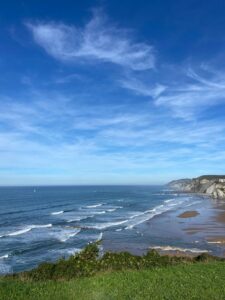
© Johann von Harling
Cost near by Bilbao
When viewing apartments, it is important to ensure that the windows are reasonably insulated for winter stays, and in summer, having air conditioning in the apartment may be necessary. When I arrived in Bilbao in October, the first few days were still very warm, with temperatures reaching up to 35°C. However, temperatures in winter also drop to very low values of around 0°C to 10°C, so having heating and well-insulated windows can contribute to comfort. Many students in Bilbao live in neighborhoods like Indautxu, Deusto, or Casco Viejo. However, there are apartments scattered throughout the city. Idealista is highly recommended as a portal for apartment hunting in Spain. Alternatively, you can also search for real estate agencies online. Bilbao is a relatively modern city for Spain, with many high buildings. On the other hand, it also has a beautiful old town area in Casco Viejo. The average living costs are quite comparable to the living costs in Germany although visits in restaurants and bars can be significantly cheaper from time to time. Prices in supermarkets are very much the same as in Germany, but the costs of a visit in bar or a restaurant can be regarding the restaurant a lot cheaper. It is also recognizable that Bilbao has one of the highest densities of Michelin Star restaurants in Spain and if you like you can as well try out the excellent cuisine.
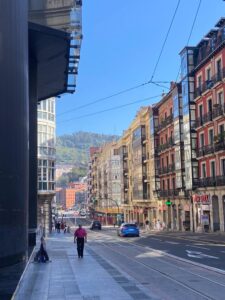
© Johann von Harling
Bilbao offering excellent transportation options with tram, metro, bus and train
Everyday life/ the internship
I completed the internship full-time, mainly in the office in downtown Bilbao. The atmosphere within the international team was very professional yet friendly outside of working hours. The predominant language in the company was English due to international projects. However, the conversation would also occasionally switch to Spanish or German, which I enjoyed and which contributed to improving my language skills in several languages. The internship involved working on technical projects, which were well-suited to the knowledge gained from studying industrial engineering. Projects in the field of electromobility, artificial intelligence, and general automotive production were the focus. The working hours for a consultancy were mostly between 8:30 am and 7:30 pm, which included most times a lunch break of half an hour to one hour, where we sat together with all the employees. Usually in the week most time was spent at the office and free time afterwards in walks around the various streets in the city and weekends were used to do bigger journeys and small trips within the near of Bilbao or other cites in Spain.
Free time/tips
Leisure time in Spain, especially in Bilbao, can be very diverse depending on the season. During the warm autumn days, trips for hiking, relaxing, swimming, and surfing along the coast of Bilbao are highly recommended. With the metro, you can reach the vicinity of the beach for €1.50 within 30 minutes and then reach it on foot after a short hike (15-20 minutes). The coastline consists of steep cliffs and long beaches. Additionally, you can also utilize the surrounding mountains near Bilbao on weekends for short hikes to get a view over the entire region. Bilbao is located in northern Spain, and there are many noteworthy cities nearby such as Santander, San Sebastian, Pamplona, Zaragoza, or even Madrid. The Cantabrian and Basque regions, in general, are highly recommended for excursions. A recommendation to create more leisure time during the internship is to strategically choose vacation days to have long weekends, allowing for short trips to more distant cities like Barcelona, etc.
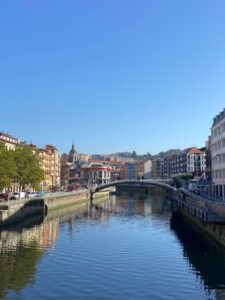
© Johann von Harling
Bilbao city quarters seperated by river
A recommendation for Bilbao is to explore the culinary diversity of Spanish specialties offered in many small local eateries. There is a rich culture of pintxos (tapas) available at many times of the day. Furthermore, Bilbao offers a lot of culture with the world-famous Guggenheim Museum or the football matches of the renowned Spanish football club Atletico Bilbao, which take place in the San Mames Stadium. I really enjoyed the internship because during that time, occasional team events were organized in which employees could participate, happening on weekends or after work. For example, there was the Bilbao Marathon, in which we could participate in various distances such as 10 km, half marathon, or marathon. During this race, the entire city was closed off for one evening, with about 13,000 people participating and many thousands more cheering on the streets of Bilbao.
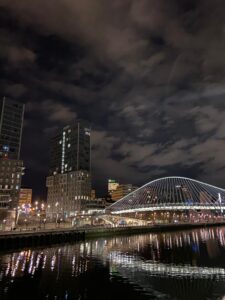
© Johann von Harling
Bilbao with modern buildings in the city center
Conclusion
An international internship is recommended for students who want to improve their language skills in a language other than their native language, are interested in new cultures, and at the same time want to experience the working style in another country within a company. Living abroad provides a different perspective on many things and broadens one’s horizons. The internship offers a very good opportunity to combine the interest in international experience with the interest in professional experience. In addition to the internship, you have the opportunity to explore new cities, different places, and another culture. Spaniards exude joy of life, which is recognizable in many everyday situations. Next to working, I really enjoyed the trips we organized either with working colleagues or with friends, where we could further explore the great cities and landscapes of Spain and discover even more how diverse this country is.
I am very glad, that I had this opportunity supported by Erasmus Internship, that offered me to experience the work culture as well as the live and culture in a different country. I hope that many people will also have this opportunity and support to experience such great possibilities.
Internship in Bilbao
- Business Administration and Engineering Mechanical Engineering M.Sc.
- Spain, Bilbao
- FEV Consulting Iberia
- 10/2023 – 01/2024
- Application/Finding an internship
Securing my Erasmus internship at FEV Consulting in Bilbao was a smooth process, given my already six-month experience as a working student at the company before applying. Informal discussions with my mentor paved the way, expressing my interest to the Bilbao office head during a professional reunion further gave me the opportunity.
Drawing from the experiences of previous German interns in the company, I tapped into an established network to gather insights and advice. What helped the process further was the early acceptance, granted six months before the start date. This provided enough time to plan and fulfill all Erasmus requirements, ensuring a well-prepared transition into this international experience.
- Accomodation & Living expenses
Securing accommodation in Bilbao proved to be a straightforward process. I aimed for a room in a recently established apartment, sharing the space with three others of working age. The monthly cost of the room was around 600€, exclusive of management and cleaning fees, alongside a one-month deposit.
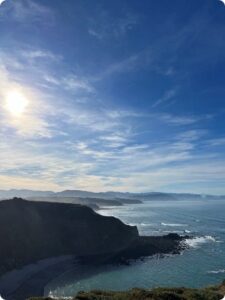
© Tom Benjamin Rummel
An advantageous aspect of my housing arrangement was the ability to review the apartment and complete the contractual formalities online prior to my arrival in Bilbao. This ensured a good transition before reaching my destination. Fortunately, my flatmates were predominantly Spanish speakers, affording me an ideal environment to practice and enhance my language skills within the rooms of my residence.
Financially, I received the Erasmus fee along with the minimum Spanish salary paid for my internship. In terms of living expenses, Bilbao’s cost of living equal my experiences in Aachen. But social outings are more economical, with soft drinks, beer, and wine averaging around 2€ per drink. Additionally, the culinary delights of the region (Pintxos, small tapas on bread) range from 2 to 3 euros per piece.
The public transportation system, particularly the metro, benefits from state subsidies, making it exceptionally affordable. A standard metro fare amounts to approximately 50 cents, contributing to the overall accessibility of transportation within the city.
- Everday life / the internship
Managing my everyday life during my Erasmus internship at FEV Consulting in Bilbao was a dynamic experience. Throughout the workweek, my days were filled with a good workload, leaving little time for activities beyond sports and cooking post-work.
While the option of working from home was available, it was relatively uncommon. I chose to commute to the office daily, a practice that proved to be beneficial. Leaving my laptop at the office made a clear separation between work and personal life, allowing me to disconnect at home without work-related considerations. This setup also provided flexibility for post-work engagements, as I carried no bag after work.
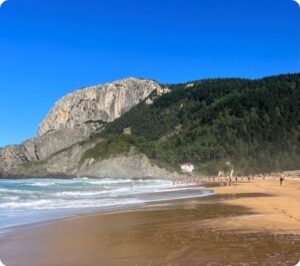
© Tom Benjamin Rummel
The standard working hours spanned from 8:30 to 18:30, including a long lunch break lasting an hour or sometimes even more. Colleagues, including myself, brought their own meals, creating a communal atmosphere during shared lunches and occasional ping pong matches.
Professionally, this period was pivotal as I undertook increased responsibilities within the company, starting with the management of my own small-scale project. English served as the primary working language, contributing to a cohesive and collaborative environment.
The office, characterized by an average age of around 28, has a cohesive and homogeneous team with shared interests. Social activities played a significant role, with a weekly soccer match against other local companies and Friday afternoons often concluding work a bit earlier. This allowed the team to go out into the lively streets of Bilbao, fostering the relations beyond the activities of the workplace.
- Free time/tips
Leveraging free time in Bilbao was an awesome exploration, as the city offered diverse options throughout the week, each drawing a varied crowd of locals spanning all age groups.
Going into different restaurants and locales became a personal priority whenever time allowed, though the city’s richness proved too big to conquer fully, even in its seemingly “small” boundaries.
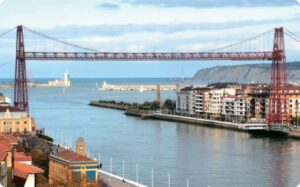
© Tom Benjamin Rummel
Three standout memories summarize my time in Spain. Foremost among them was the exploration of the seaside. The Atlantic coast unfolded a breathtaking panorama with expansive beaches, rough cliffs, and scenic paths for hikes or runs. The autumn weather allowed for enjoyable beach days, easily accessible within 30 minutes from the city center via the metro, costing just 50 cents. The surrounding regions revealed more treasures, showcasing diverse beaches and natural habitats.
On the opposite side of Bilbao lay the mountains, offering beautiful hikes with stunning views. Noteworthy expeditions included a 20 km hike to Gorbea in November and a spontaneous walk to Pagassari, a mountain right next to Bilbao. The accessibility of the countryside was evident as I strolled directly from my apartment, exemplifying the accessibility of nature next to urban living. Every favorable weekend weather was used by me to explore new surroundings, still leaving plenty of unexplored spots for future visits.
December presented an opportunity to make use of national holidays in Spain. A fellow intern and I used this chance to embark on a five-day adventure to Barcelona. The trip, undertaken by bus, a common mode of transportation in Spain, was a seven-hour journey.
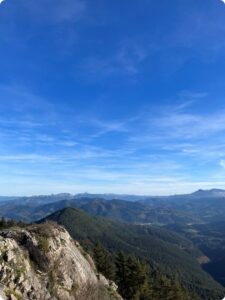
© Tom Benjamin Rummel
Barcelona welcomed us with pleasant weather and some Christmas markets, making the experience an unforgettable highlight of the whole season.
- Conclusion
Reflecting on my Erasmus internship at FEV Consulting in Bilbao, the experience surpassed my expectations in various ways. The seamless application process
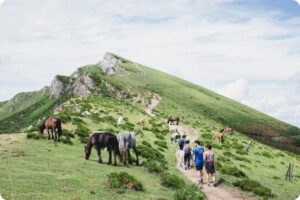
© Tom Benjamin Rummel
, coupled with the early acceptance, allowed me to embark on this adventure well-prepared and with anticipation. Living in Bilbao proved to be important for professional growth and personal enrichment. The daily routine, centered around a dynamic work environment, was complemented by the vibrant and diverse offerings of the city. The accommodating living situation, with engaging flat mates and reasonable living costs, added to the overall positive experience.
Professionally, the internship provided invaluable opportunities. From managing my first project to enhanced responsibilities, the exposure and guidance received significantly contributed to my professional development. The language-intensive work environment in English and the cohesive team dynamics created an atmosphere for learning and collaboration.
Beyond the workplace, Bilbao offered a rich diversity of experiences. Exploring the city’s culinary delights, embracing the natural beauty of the Atlantic coast and nearby mountains, and seizing opportunities for travel, particularly to Barcelona, added memorable dimensions to my time in Spain.
In conclusion, my Erasmus internship in Bilbao was a holistic journey encompassing professional growth, cultural immersion, and personal exploration. The memories stay, both within the workplace and beyond, will undoubtedly remain an important part of my academic and professional journey. As I look back, I am grateful for the experiences gained and the connections made, eagerly anticipating the chance of returning one day to continue the exploration of this region.
Internship in Bilbao
- Automotive Engineering and Transport M.Sc.
- Spain, Bilbao
- FEV Iberia SI.
- 04/2023 – 09/2023
Application
I wanted to join the Erasmus mobility internship program with the primary goal of gaining international and intercultural experience. An important aspect of my application was that there was no formal process needed, as I had been working with the host company, FEV Consulting GmbH, for approximately half a year as a working student prior to this experience. This established connection eased out the process and facilitated my placement abroad. The choice of Bilbao, Spain as my destination was motivated by my desire to explore a country I had barely visited before, offering me the opportunity to dive into a new culture and language. Moreover, the presence of a FEV Consulting GmbH office in Bilbao made it a fitting location for my internship.
Accommodation and Living Expenses
Finding accommodation in Bilbao proved to be an interesting challenge, as my internship did not align entirely with the typical Erasmus semester. Student accommodations were already occupied, leaving little available options. Luckily, I found a shared apartment on idealista.com, where I lived with young professionals from Spain between the city districts Sarriko and Deusto. The apartment, although located slightly outside the city center, provided a comfortable place to live at a cost of 500€ per month, which included all expenses and even a cleaning service for common areas. It was recently renovated, though my private room was not particularly spacious, and the flat lacked a common living room outside of the kitchen. For future participants seeking accommodation in Bilbao, I recommend joining Facebook or WhatsApp groups for Erasmus students in advance to explore shared housing options. Alternatively, living in a hostel for an initial month while searching for a permanent flat is a viable option. Being present in the city allows for more convenient flat viewing. Important to highlight is not to search for a flat south of Calle Autonomia and the city district San Francisco. Crime rates a quite high and walking in the streets at night can be dangerous as many people get robbed there, even at daytime. Regarding living expenses, I found that approximately 350€ per month covered food and going out. Food prices were comparable to Germany, while drinks in bars were notably more affordable in Spain.
Internship
During my internship, I had an official eight-hour workday contract, although my effective working hours exceeded that throughout the entire internship. Within the consultancy firm, my responsibilities primarily involved desktop research and preparing presentations for the strategic management level of our clients. A significant highlight of my internship was to write my master’s thesis during a customer project, where I developed a Microsoft Excel model for assessing the cost of the battery recycling ecosystem. I also had the opportunity to give presentations in front of the customer, taking on additional responsibilities. Surprisingly, I found no significant cultural or professional differences when compared to the German offices of the company. This allowed me to seamlessly integrate into the work environment while making friends with my Spanish colleagues. The key takeaways in terms of work were advancing my proficiency in Microsoft Excel and internalizing the tools of a consultant. As the corporate language of the company is English, I couldn’t improve my Spanish language skills in the everyday work environment. Therefore, I remotely attended an intensive Spanish course at RWTH Aachen University with a scope of three hours per week, targeting language level A1. I highly recommend attending language courses in case the skills cannot be improved within the work environment.
Free Time
Bilbao offers several free-time activities, including visits to the beach, surfing, and hiking. The city’s closeness to nature and the well-established public transportation system with a metro and buses make these activities easily accessible. A must-visit are Sopelana Beach and Artxanda Mountain in particular. Additionally, I participated in cultural events such as the Pamplona bull run and city festivities that spanned 1.5 months, starting in early July. In Bilbao it is essential to know the Spanish language very well to make local friends, as most Basques do not speak English fluently. Furthermore, the attitude of the Basque people towards foreigners is rather closed, making integration into the society hard. To have a fun time, one should seek for making international friends which is quite easy when meeting other Erasmus students, as most of them have an open-minded attitude. Besides, it might be a good idea to search for tandem partner for both improving the language and getting to know local people. For exploring Bilbao, I highly recommend strolling around the city and visiting many different Pintxo bars. Besides, Bilbao has three main spots to go out. Calle Poza, Calle Ledesma and Casco Viejo. Calle Poza attracts mainly students and young people with its variety of bars. Calle Ledesma is a little bit more expensive and fancier, and the average age of people who go out there is slightly higher than at Poza. Casco Viejo is the old town of Bilbao. It’s very touristic and offers several interesting bars and restaurants at niche spots. Most common to go out are Plaza Nueva and Barrenkale. For those exploring Bilbao’s surroundings, I highly recommend visiting for example Pamplona, San Sebastian, Pikos de Europa, Bermeo, and Gernika. Being in Spain also offers the opportunity to visit Portugal or even Morrocco.
Conclusion
This Erasmus mobility internship experience has left a significant mark on my personal and professional development. I have integrated the lightheartedness of Spanish culture into my everyday life and mindset, which has brought a valuable perspective to my approach to work and life in general. Moreover, I learned the importance of balancing a busy consultant’s lifestyle with enriching free-time activities. This Erasmus+ mobility has further encouraged me to continue exploring foreign countries and cultures in the future. It has consolidated my belief in the great value of international experiences in shaping a well-rounded and adaptable individual.
My internship in Bilbao
- Business Administration and Engineering M.Sc. Mechanical Engineering
- Spain, Bilbao
- FEV Iberia SI
- 10.10.2022-15.01.2023
Preparation:
When it comes to preparing for a stay in Bilbao, the most important thing is housing. In general, finding a place to live in Bilbao is not as stressful as in other cities. The best place to look for housing is “idealista”, a Spanish online real-estate marketplace. Prices obviously differ, but finding adequate housing for around 500 Euro/month is possible. Especially, when you can communicate in Spanish and also stay for at least half a year. Also, there are Erasmus Telegram and Whatsapp groups (you can find them on Instagram or in the Internet) where rooms are offered as well. Besides to look for housing, this is also a great way to make first contacts in the city. Another important preparation would be to look for health insurance. I had the luck that it was organized by the company.
Finding an internship:
In my case, I was a working student in the Aachen Office of the company I then worked for in Bilbao. Generally, going for an international company is the easiest way to find an internship abroad and that’s also how most people I talked to did it. Especially, when you are not fluent in Spanish, a regular local company will be tough to convince to take you.
Culture:
Most people have been to parts of Spain before, so I guess a Culture shock is not to be expected in
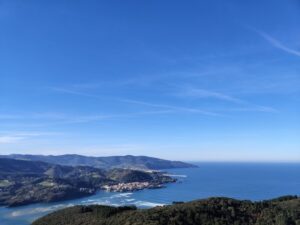
© Lukas Tacke Genannt Unterberg
that case. However, Bilbao is part of the former Basque-county. Even if it is technically Spain, the people are often quite proud of their heritage. Some might take it as an insult, if you call them Spaniards. Additionally, the Basque language is very prominent. You will hear it on the streets and read it a lot on signs. It is very different from Spanish, so don’t be fooled thinking it is just some form of dialect you might be able to understand! All in all I must say, people were very welcoming and most of the time happy to help and communicate, even if there isn’t actually a common language between you. The level of English capabilities is very low in that area, so basics in Spanish or Basque can be very helpful.
Day to day life:
Coming from the culture, food plays a very significant role there. Pintxos (A slice of bread with ANY savory toping you can think of) might be the most prominent one. You can take them for lunch or in the evening with some drinks. Since the city is next to the ocean, fish and other seafoods are integrated in a lot of dishes. If you are a vegetarian or a vegan, it might be hard for you. In more traditional restaurants the vegetarian dish is just a salad or something along that line, so you might want to go to more modern places.
When it comes to going out in the night, Bilbao has a lot to offer. Especially in the casco Viejo (old town) the bar density is very high. But also throughout other parts of the city, you will always find a nice place to grab a beer or a Kalimotxo (popular Basque drink, red wine with cola) and some Pintxos. The club landscape is definitely more restricted. For most clubs, you have to love reggeaton, since it will be played the whole night. But there are also some clubs, where the music choices are more diverse (strong recommend for “Sala Sonora” for Saturdays).
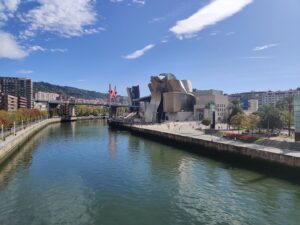
© Lukas Tacke Genannt Unterberg
Public transport is ridiculously cheap and easy in Bilbao. You go to any bigger metro station and buy a “Barik Card”, on which you then can load money. From then on, you just touch-and-go for trains, buses and the metro for prices mostly below 50 cents per ride. The metro also goes all the way to the ocean. Plentzia and Sopella are the beaches reachable by metro I recommend the most. If you want to explore the area, for hikes or to visit other towns nearby, going by bus (Asta or bizkaibus) is a very good option. Most beautiful places I have seen are: San Sebastian, Gangekogorta and the Urdaibai area.
When it comes to work life, in my case it was very similar to my experiences in German companies. Similar working hours, with maybe a longer lunch break and in my case an amazing office climate. My co-workers were always happy to help with tasks or problems at work, but also with recommendations what to do in the area on weekends or which restaurant to go to.

